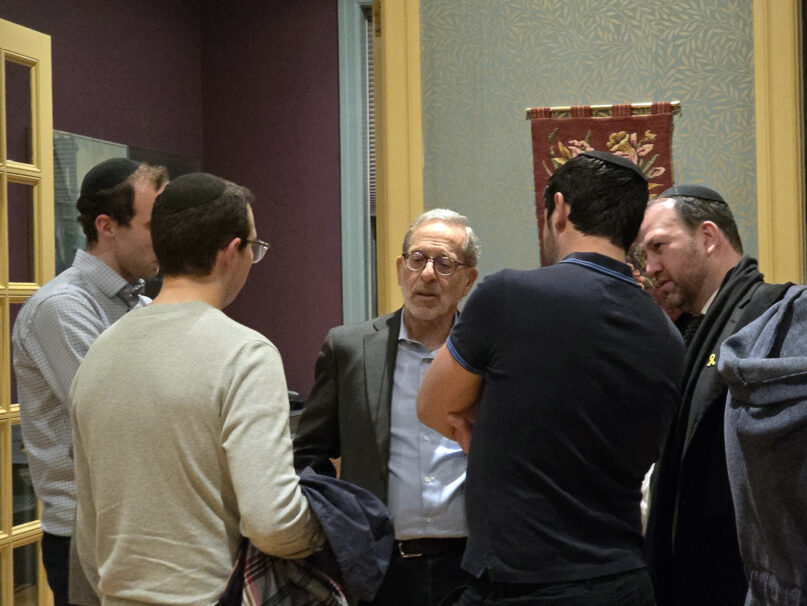(RNS) — Over the past year, a group of mostly modern Orthodox Jews has met in living rooms on the Upper West Side of Manhattan to discuss Israel’s devastating war in Gaza and to hear from Jews and Palestinians critical of the country’s occupation and government.
In November, the salonlike gathering invited Rashid Khalidi, the Columbia University Palestinian-American history professor. Some 70 Orthodox or self-described observant Jews attended.
And on Sunday (March 30), the group will host its first daylong conference. At the forum, Israeli, Palestinian and American Jewish speakers will discuss Jewish power, the occupation, U.S. support for Israel and the moral implications of the Gaza war. It will screen a 20-minute clip of the Oscar-winning documentary “No Other Land,” which shows the ongoing destruction of a Palestinian village in the West Bank by Israeli soldiers.
The conference is a noteworthy turn. Orthodox Judaism, both in the United States and Israel, has typically espoused a right-wing political orientation that includes unconditional support for Israel. Orthodox and Haredi Jews in the U.S. generally stand apart from the majority of the American Jewish community in their support for President Donald Trump and his policies regarding Israel. Five of the six parties that make up Israel’s government are either Orthodox or religious Zionist.
But the ongoing war in Gaza has produced a challenge to that status quo. David Myers, a history professor at University of California, Los Angeles, who has spoken at the salon and will speak at the conference, called it a kind of “coming out party.”
“It’s really allowing for an important strand of American Jewish public opinion to be heard,” Myers said. “This voice is not being heard in places where it should be heard — like in our synagogues, which are overwhelmingly flag-waving, and ‘We stand with Israel,’ which means we stand with the Netanyahu government.”

Columbia University history professor Rashid Khalidi, center, talks with attendees during a Nov. 25, 2024, gathering in a New York City home. (Photo courtesy of Smol Emuni)
The conference will take place at B’nai Jeshurun on the Upper West Side. So far, 300 people have registered to attend in person and another 300 online.
RELATED: Oscar-winning Palestinian director is attacked by Israeli settlers and detained by the army
The conference is partnering with a small Israeli group called HaSmol HaEmuni, or “the faithful left,” in Hebrew. The group was created in January 2023 in response to the 2022 Israeli election, which brought to power the most right-wing and religiously conservative government in the country’s history.
One of the leaders of that movement, Mikhael Manekin, will speak at the conference.
“We’re religious individuals who see our politics geared towards equality as a manifestation of our religious identity,” Manekin said. “It stems from a larger view, a both religious and political understanding, of the need for the freedom and dignity of human beings.”
The “Smol Emuni US Conference,” as Sunday’s event is called, is not expected to deal with the long-running American Jewish identity dispute pitting Zionists and anti-Zionists against each other. Nor is it intended to herald the start of a nonprofit organization, sources told RNS.
“We have a diversity of opinions within our own group,” said Rachel Landsberg, a Jewish educator who is part of the team planning the conference. “What we think is important is to have open conversations and to be able to challenge and question.”

People attend a salonlike gathering in a New York City home to discuss Israeli-Palestinian issues. (Photo courtesy of Smol Emuni)
Panels include a session on Jews as a “chosen” people and the imperative to treat all human beings in the image of God; a session on how to speak out against Israel; and a session on the political legacy of Yiddish and Arabic. Two Palestinian Israelis will also speak.
Esther Sperber, an Israeli-born architect who now lives in New York City, was one of the founders of the salon. Sperber, who defines herself as observant rather than Orthodox, attends Darkhei Noam, a lay-led congregation on the Upper West Side where much of the group originated, though it now draws observant Jews from across the city and New Jersey, too. Her father, Rabbi Daniel Sperber, is the halakhic adviser to the congregation.
Esther Sperber has been active in campaigns to release the hostages captured from Israel by Hamas on Oct. 7, 2023. Over time, though, she began to feel that part of her Jewish values was not being addressed.
The salonlike meetings and the conference can be seen as an attempt to “rescue” her Judaism, she explained, and to “bring it back to being compassionate — one that loves justice, kindness and humility.”
“There was a central part of my spiritual and religious commitments that was not getting any expression: the beliefs that all human life is sacred, the belief that no people are more worthwhile than other peoples,” she said.
RELATED: Trump ‘slurred’ Schumer as a Palestinian. In most parts of the world, it’s a compliment.